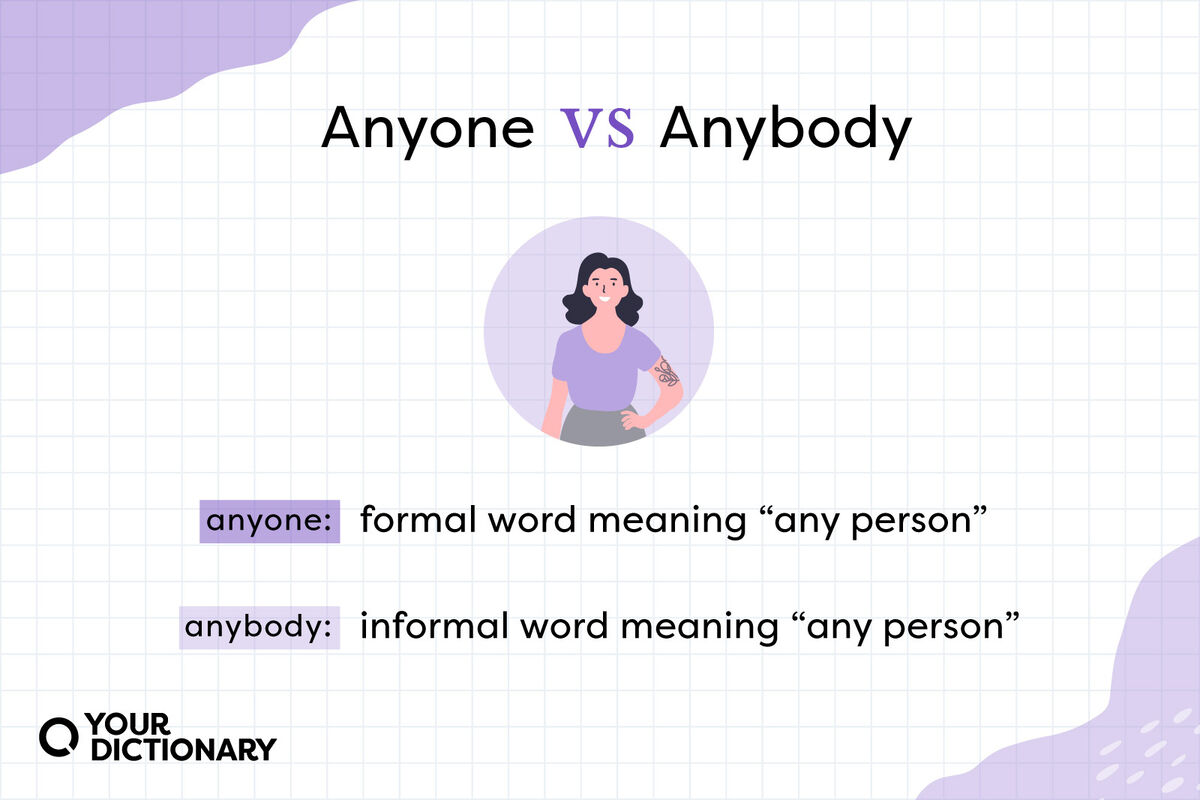
The words anyone and anybody are very similar. For the most part, these terms can be used interchangeably. Discover the main difference between anyone vs. anybody, along with tips on how to correctly use these terms in spoken and written communication.
Anyone vs. Anybody: Similarities and Differences
The words anyone and anybody are more similar than they are different. There are no definitive rules regarding when you should use one of these words vs. the other.
- similarities - Both words mean the same thing and represent the same part of speech. These words are both singular indefinite pronouns that mean any person.
- differences - Anyone is a more formal term than anybody. As a result, anyone is generally considered the best choice for formal settings and writing.
Because these words are so similar, it doesn't matter which word you use in most situations. You can use either word in face-to-face conversations, when writing dialogue and in many other types of writing. If you are concerned with using the most formal options in certain situations, such as business documents or academic writing, anyone is somewhat preferable to anybody.
Example Sentences With Anyone and Anybody
Review a few example sentences that feature the words anyone and anybody. Since these indefinite pronouns are interchangeable, you could replace anyone with anybody (and vice versa) in any of the sentences without changing the meaning or creating a grammatical mistake.
- I didn't see anyone from school at the football game.
- Can anybody hear me?
- I rarely talk to anyone on the phone.
- Would anybody be willing to loan me their notes from Friday's class?
- Has anyone applied for the job opening yet?
- Does anybody want to go to the beach with me this weekend?
- I really don't think anyone in the family likes meatloaf.
- The shelter won't let just anybody adopt a dog.
Related Phrases to Consider
There are a few common collocations featuring anyone and anybody. As with the individual words, these collocations are interchangeable with the only difference being that phrases containing anybody may be interpreted as being somewhat less formal than ones containing anyone.
Anyone's Guess/Anybody's Guess
The phrases "anyone's guess" or "anybody's guess" mean that no one knows the answer. These phrases are used to indicate that an answer or solution is unknown or highly uncertain.
- Will I pass Calculus class this semester? That's anybody's guess.
- I felt like my interview went well, but whether I'll get offered the job is anyone's guess.
Anyone Else/Anybody Else
The phrases "anyone else" and "anybody else" are used to refer to any other person. These words are appropriate when one or more people have already been identified and the message speaker is checking to see if any additional person should be included.
- I'm ordering hamburgers for Steve and Thomas. Does anyone else want a burger?
- Is anybody else feeling overwhelmed with the amount of homework in that class?
Comparing Anyone vs. Anything
The word anything is similar to the word anyone, but they are used in different situations. The word anything should never be used to refer to people, while the word anyone should always refer to people. When used as a pronoun, anything refers to any item, object or thing.
- Does anyone want anything from the store?
- I feel like going shopping even though I don't need to buy anything.
Comparing Someone vs. Somebody
The words someone and somebody are closely related to anyone and anybody. Somebody is less formal than someone.
Indefinite Pronoun Usage
Like anyone and anybody, these words function as singular indefinite pronouns that can be used interchangeably with one another. When used as indefinite pronouns, these words mean "some person." This is closely related to, yet different from, the "any person" definition of anyone and anybody.
- Somebody called you last night. I can't remember who it was.
- The committee will choose someone to receive the scholarship this week.
Noun Usage
The words someone and somebody can also be used in noun form. This is not the case with anyone and anybody; those terms do not have a noun form. When used as a noun, the words someone and somebody indicate that an individual is very successful or otherwise of high importance.
- I want to be somebody when I grow up.
- Receiving the award made me see that I can really be someone if I continue to work hard.
Mastering Indefinite Pronouns
Now that you know the main differences (and similarities!) of anyone, anybody, someone, and somebody, you're on your way to mastering proper indefinite pronoun usage. While you're focused on that topic, spend some time reviewing more examples of indefinite pronouns. Explore other commonly confused terms like everybody vs. everyone. Then, test your knowledge and skills with these indefinite pronoun worksheets. From there, expand your pronoun knowledge even further by exploring the various types of pronouns.